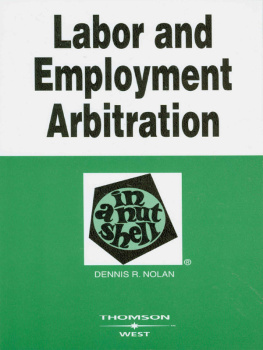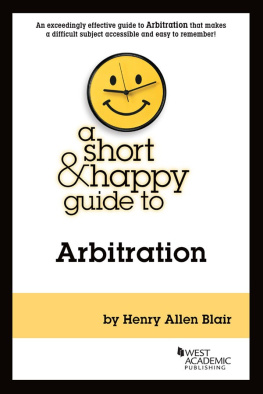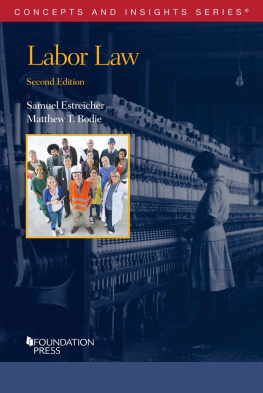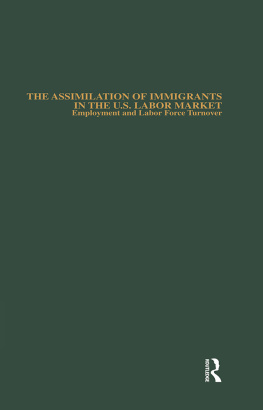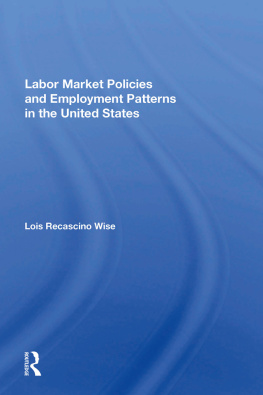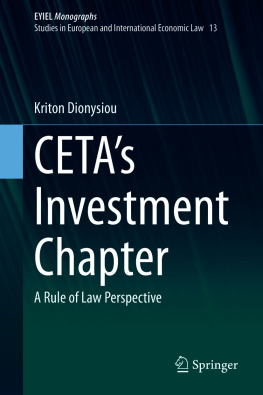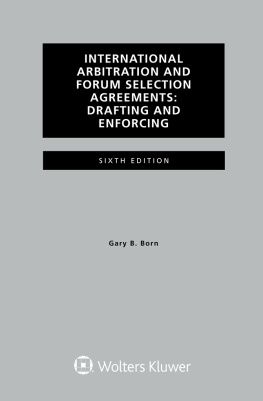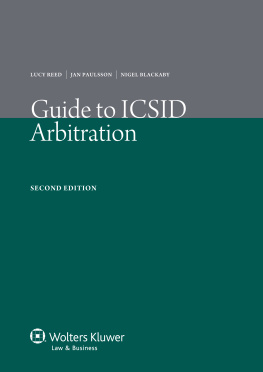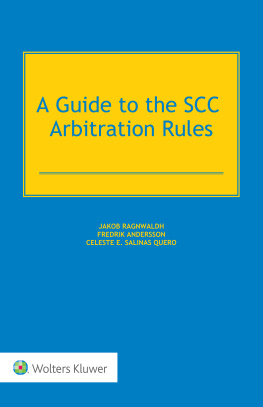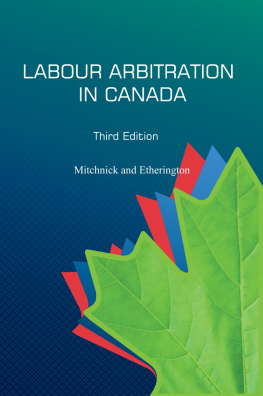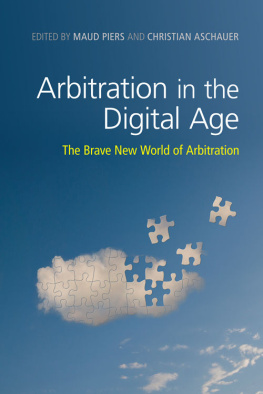Dennis Nolan - Labor and Employment Arbitration
Here you can read online Dennis Nolan - Labor and Employment Arbitration full text of the book (entire story) in english for free. Download pdf and epub, get meaning, cover and reviews about this ebook. year: 2006, publisher: West Academic, genre: Romance novel. Description of the work, (preface) as well as reviews are available. Best literature library LitArk.com created for fans of good reading and offers a wide selection of genres:
Romance novel
Science fiction
Adventure
Detective
Science
History
Home and family
Prose
Art
Politics
Computer
Non-fiction
Religion
Business
Children
Humor
Choose a favorite category and find really read worthwhile books. Enjoy immersion in the world of imagination, feel the emotions of the characters or learn something new for yourself, make an fascinating discovery.
- Book:Labor and Employment Arbitration
- Author:
- Publisher:West Academic
- Genre:
- Year:2006
- Rating:4 / 5
- Favourites:Add to favourites
- Your mark:
- 80
- 1
- 2
- 3
- 4
- 5
Labor and Employment Arbitration: summary, description and annotation
We offer to read an annotation, description, summary or preface (depends on what the author of the book "Labor and Employment Arbitration" wrote himself). If you haven't found the necessary information about the book — write in the comments, we will try to find it.
Comprehensive guide and reference tool on labor and employment arbitration law.
Labor and Employment Arbitration — read online for free the complete book (whole text) full work
Below is the text of the book, divided by pages. System saving the place of the last page read, allows you to conveniently read the book "Labor and Employment Arbitration" online for free, without having to search again every time where you left off. Put a bookmark, and you can go to the page where you finished reading at any time.
Font size:
Interval:
Bookmark:

ADVISORY BOARD
_________
JESSE H. CHOPER
Professor of Law,
University of California, Berkeley
DAVID P. CURRIE
Professor of Law, University of Chicago
YALE KAMISAR
Professor of Law, University of San Diego
Professor of Law, University of Michigan
MARY KAY KANE
Chancellor, Dean and Distinguished Professor of Law,
University of California,
Hastings College of the Law
LARRY D. KRAMER
Dean and Professor of Law, Stanford Law School
WAYNE R. LaFAVE
Professor of Law, University of Illinois
JONATHAN R. MACEY
Professor of Law, Yale Law School
ARTHUR R. MILLER
Professor of Law, Harvard University
GRANT S. NELSON
Professor of Law, University of California, Los Angeles
JAMES J. WHITE
Professor of Law, University of Michigan
Second Edition
By
DENNIS R. NOLAN
Webster Professor of Labor Law
University of South Carolina

Mat #40332643
Thomson/West have created this publication to provide you with accurate and authoritative information concerning the subject matter covered. However, this publication was not necessarily prepared by persons licensed to practice law in a particular jurisdiction. Thomson/West are not engaged in rendering legal or other professional advice, and this publication is not a substitute for the advice of an attorney. If you require legal or other expert advice, you should seek the services of a competent attorney or other professional.
Nutshell Series, In a Nutshell , the Nutshell Logo and West Group are trademarks registered in the U.S. Patent and Trademark Office.
West, a Thomson business, 1998
2007 Thomson/West
610 Opperman Drive
P.O. Box 64526
St. Paul, MN 551640526
18003289352
Printed in the United States of America
ISBN13: 9780314158826
ISBN10: 0314158820

In Memory of
Joseph L. Nolan, 19101990
And for
Fran,
To Whom I Owe All
*
_________
The world of workplace dispute resolution has been transformed since I began work in that field. Twenty-seven years ago I published a predecessor volume, LABOR ARBITRATION IN A NUTSHELL. In 1979, workplace dispute resolution was virtually synonymous with labor arbitration. Like most other labor lawyers at the time, I had no inkling that labor arbitration would become a mere subset of a much broader topic.
In 1991, the Supreme Court decided Gilmer v. Interstate/Johnson Lane , 500 U.S. 21, and inadvertently expanded individual employment arbitration from a niche market largely confined to the securities industry into a growth market now covering many millions of employees. When the world was ready for another new book, I published the first edition of LABOR AND EMPLOYMENT ARBITRATION IN A NUTSHELL (1998). Despite equal billing in the title, employment arbitration occupied a relatively small portion of the work, and even that coverage appeared almost as afterthoughts at various points in the expanded coverage of labor arbitration. The explanation for such limited treatment was simple: the legal parameters of employment arbitration were, even seven years after Gilmer , just beginning to be drawn. Even the most basic questions, such as whether the Federal Arbitration Acts exclusion of contracts of employment meant that the FAA did not apply to any employment contract, were still up VI for grabs. There were still very few employment arbitration agreements in place, and these produced relatively few attempts to compel or resist arbitration. There was, in short, little raw material for the writer to use.
How the field has changed since then! Labor arbitration, which at the beginning of my career filled the universe, has shrunk apace with the unions that use it. Unions represent barely an eighth of todays workforce (and less than a twelfth of the private sector workforce) compared to nearly a quarter in 1979. Union membership dropped by 29% during those years from a near-peak of 22 million to just 15.7 million. There are no precise figures on the total number of labor arbitrations, but some data support an educated guess that the they have declined roughly in proportion to the decline in union membership. That correlation is intuitively reasonable, given the lack of any reason to believe that unions would arbitrate more frequently, in relation to their membership numbers, than they used to.
In the meantime, however, individual employment arbitration became an established practice. The courts now uniformly enforce arbitration agreements in the face of most legal challenges. Various court decisions have marked the requirements necessary to make an arbitration binding. Arbitration providers like the American Arbitration Association have created separate panels of arbitrators qualified to deal with statutory issues. Ethical guidelines have been developed by arbitration providers, by the National Academy of Arbitrators, and by the blue-ribbon VII committee of advocates, arbitrators, and agencies that drafted the Due Process Protocol in 1995. The number of such cases remains smallperhaps several thousand a yearbut those arrangements cover more employees each year and inevitably will produce more arbitrations.
The time is therefore ripe for a second edition that gives employment arbitration the serious attention and analysis it deserves, while also updating the material on labor arbitration. Because one can no longer view employment arbitration as a simple addendum to labor arbitration, the second edition now consists of two distinct parts. Part I covers labor arbitration. The changes from the last edition consist mainly of updating, stylistic improvements, and some reorganization. Part II covers employment arbitration. In three new chapters, I consider employment arbitrations origins and legal bases; the requirements for, and impediments to, enforcing individual arbitration agreements; and the special procedural concerns presented by employment arbitration under the FAA.
This book is not intended as a substitute for classroom instruction in labor and employment arbitration, still less for practical experience in the field. Nor is it intended to (or could it) take the place of the detailed treatises already available to the practitioner and scholar. Its purpose is much narrower, to provide students and practitioners alike a simple but comprehensive description of labor and employment arbitration in America. Ideally this overview VIII will serve as an introduction to more thorough study in other forms.
Even this limited purpose requires a good bit of detail. While trying to strike a balance between simplicity and comprehensiveness, I may have erred too much in the latter direction. If so, I apologize to the reader who looks for a shorter treatment. Nevertheless, I found it necessary to present the major issues in arbitration law at length to permit a full exploration of their importance and of the conflicting opinions on them. I have made every effort to be fair, but inevitably some personal beliefs have made their way into the text. The attentive reader should be able to identify these easily, and evaluate them accordingly.
Font size:
Interval:
Bookmark:
Similar books «Labor and Employment Arbitration»
Look at similar books to Labor and Employment Arbitration. We have selected literature similar in name and meaning in the hope of providing readers with more options to find new, interesting, not yet read works.
Discussion, reviews of the book Labor and Employment Arbitration and just readers' own opinions. Leave your comments, write what you think about the work, its meaning or the main characters. Specify what exactly you liked and what you didn't like, and why you think so.

